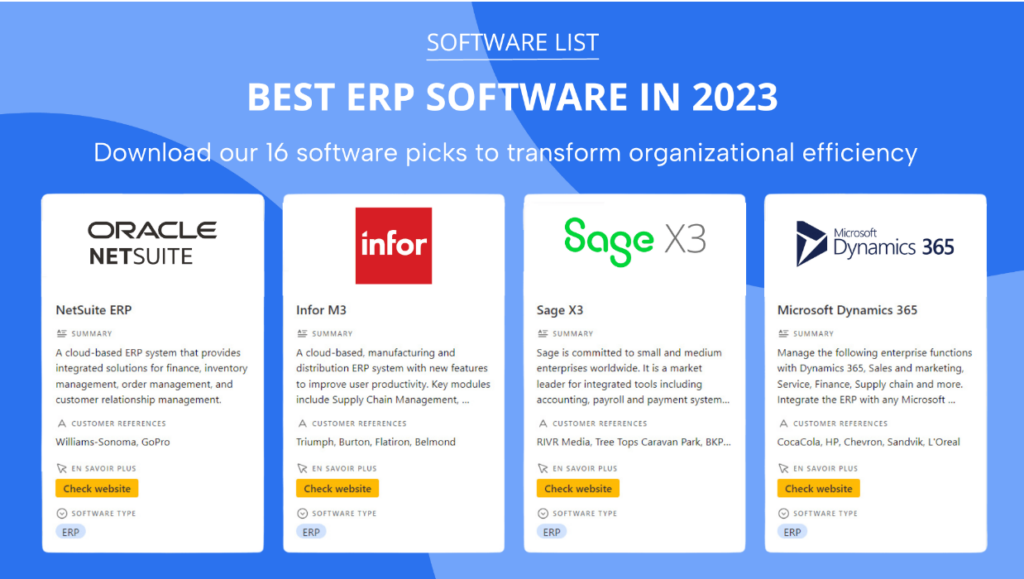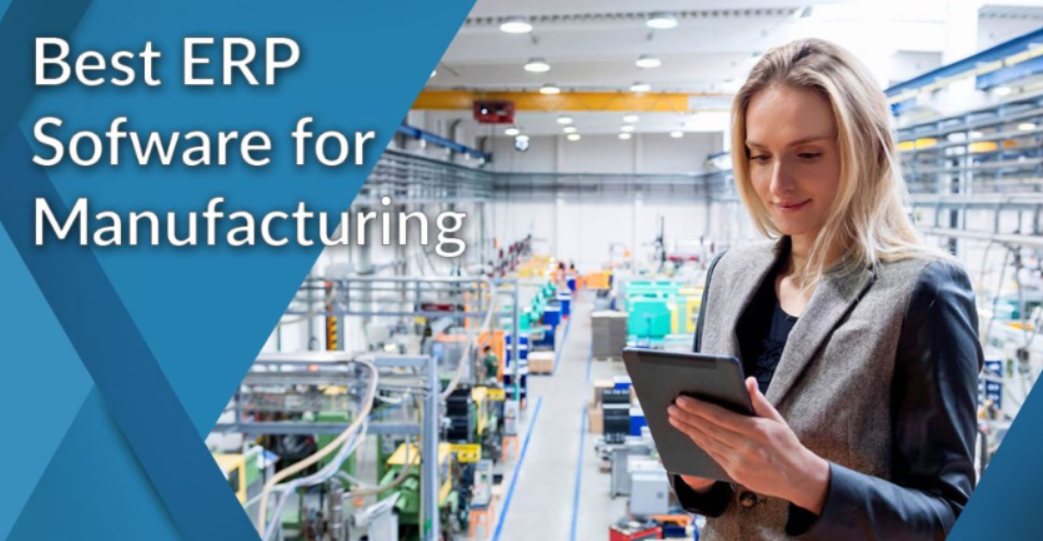In today’s rapidly evolving manufacturing landscape, Enterprise Resource Planning (ERP) software has become an indispensable tool for businesses seeking to optimize their operations, enhance productivity, and maintain a competitive edge. The manufacturing industry, with its complex processes, intricate supply chains, and stringent quality control requirements, presents unique challenges that demand specialized ERP solutions. This article aims to explore the best ERP software options available for the manufacturing industry, analyzing their features, strengths, and suitability for various manufacturing sub-sectors.
As we delve into this analysis, it’s important to note that the “best” ERP solution can vary depending on factors such as company size, specific manufacturing processes, budget constraints, and long-term business goals. Therefore, this review will focus on a range of top-tier ERP solutions that have demonstrated particular strength in addressing the needs of manufacturing businesses across different scales and specializations.
Key Features Essential for Manufacturing ERP Software
Before examining specific ERP solutions, it’s crucial to understand the key features that are particularly important for manufacturing businesses. These features form the foundation of our evaluation criteria:
- Production Planning and Scheduling:
- Advanced scheduling algorithms
- Capacity planning and resource allocation
- What-if scenario planning
- Inventory Management:
- Real-time inventory tracking
- Multi-location inventory management
- Lot and serial number tracking
- Supply Chain Management:
- Supplier relationship management
- Demand forecasting
- Procurement automation
- Quality Control:
- Quality assurance processes
- Compliance management
- Traceability features
- Shop Floor Control:
- Real-time production monitoring
- Machine integration and IoT capabilities
- Work order management
- Product Lifecycle Management:
- Bill of Materials (BOM) management
- Engineering change control
- Product configurator
- Financial Management:
- Cost accounting
- Project-based accounting
- Multi-currency and multi-company support
- Reporting and Analytics:
- Real-time dashboards
- Custom report generation
- Predictive analytics capabilities
- Integration Capabilities:
- API availability
- Integration with CAD/CAM systems
- E-commerce platform integration
- Mobile Accessibility:
- Mobile apps for on-the-go access
- Responsive design for various devices
These features collectively enable manufacturing businesses to streamline their operations, improve decision-making, and adapt quickly to market changes. The best ERP solutions for manufacturing will excel in most, if not all, of these areas.
Top ERP Solutions for Large Manufacturing Enterprises

For large manufacturing enterprises with complex operations and extensive resources, the following ERP solutions stand out:
- SAP S/4HANA:
SAP S/4HANA is a powerhouse in the ERP world, offering comprehensive capabilities for large-scale manufacturing operations. Its strengths include:
- In-memory computing for real-time analytics
- Extensive industry-specific solutions
- Advanced supply chain and production planning tools
- Robust financial management capabilities SAP S/4HANA is particularly well-suited for manufacturers with global operations and complex supply chains. However, it requires significant investment in terms of cost and implementation time.
- Oracle ERP Cloud:
Oracle’s cloud-based ERP solution offers a strong set of features for large manufacturers:
- Integrated supply chain and manufacturing cloud services
- Advanced planning and scheduling capabilities
- Built-in analytics and reporting tools
- Seamless integration with other Oracle cloud applications Oracle ERP Cloud is notable for its flexibility and scalability, making it a good fit for manufacturers looking to leverage cloud technologies.
- Microsoft Dynamics 365 Supply Chain Management:
Part of the Dynamics 365 suite, this solution offers:
- Strong integration with other Microsoft products
- Advanced warehouse and inventory management
- IoT and mixed reality capabilities for production floors
- AI-driven insights and predictive maintenance Microsoft’s solution is particularly strong in its user interface and integration capabilities, making it attractive for companies already invested in the Microsoft ecosystem.
These solutions offer the depth of functionality and scalability required by large manufacturing enterprises. They excel in handling complex, multi-site operations and provide advanced analytics capabilities to drive strategic decision-making.
Best ERP Options for Small to Medium-sized Manufacturers
Small to medium-sized manufacturers often require more cost-effective and quickly implementable solutions. The following ERP systems are well-suited to this segment:
- Epicor ERP:
Epicor has a strong focus on manufacturing and offers:
- Comprehensive production management features
- Strong scheduling and planning capabilities
- Industry-specific functionality for various manufacturing sub-sectors
- Flexible deployment options (cloud, on-premises, or hybrid) Epicor is known for its user-friendly interface and relatively quick implementation time, making it popular among SMEs.
- Infor CloudSuite Industrial (SyteLine):
This cloud-based solution is tailored for discrete manufacturers and offers:
- Advanced planning and scheduling
- Robust quality management features
- Strong configurator capabilities for complex products
- Industry-specific functionality Infor CloudSuite Industrial is particularly strong in addressing the needs of make-to-order and engineer-to-order manufacturers.
- IQMS (now part of Dassault Systèmes):
IQMS, now known as DELMIAWorks, specializes in manufacturing ERP and offers:
- Real-time production monitoring
- Comprehensive quality management tools
- Strong capabilities for plastic processors and related industries
- Integrated MES (Manufacturing Execution System) functionality IQMS is notable for its deep manufacturing-specific functionality and is particularly well-regarded in certain niche manufacturing sectors.
These solutions offer a balance of functionality, affordability, and ease of implementation that is often crucial for small to medium-sized manufacturers. They provide the core ERP capabilities needed to streamline operations without the complexity and cost associated with larger enterprise solutions.
Specialized ERP Solutions for Niche Manufacturing Sectors
Certain manufacturing sub-sectors have unique requirements that are best addressed by specialized ERP solutions. Here are some notable examples:
- Process Manufacturing: BatchMaster ERP
- Formulation and recipe management
- Lot traceability and quality control
- Compliance management for regulated industries
- Ideal for food and beverage, pharmaceuticals, and chemical manufacturers
- Industrial Machinery: Jobscope ERP
- Project-based manufacturing capabilities
- Engineer-to-order and make-to-order functionality
- Strong service and maintenance management features
- Suited for machinery and equipment manufacturers
- Electronics and High Tech: IFS Applications
- Advanced planning and scheduling
- Product lifecycle management
- After-market service management
- Well-suited for electronics, telecommunications, and high-tech manufacturers
- Automotive Manufacturing: QAD Adaptive ERP
- Strong supply chain and logistics management
- EDI capabilities for automotive industry standards
- Quality management aligned with automotive requirements
- Focused on the unique needs of automotive suppliers and OEMs
These specialized solutions offer deep, industry-specific functionality that can be crucial for manufacturers operating in these niche sectors. While they may not have the broad name recognition of some larger ERP vendors, they often provide unparalleled capabilities for their target industries.
Cloud vs. On-Premises ERP: Considerations for Manufacturers
The choice between cloud-based and on-premises ERP solutions is a critical decision for manufacturers. Both options have their merits and challenges:
Cloud-based ERP:
Advantages:
- Lower upfront costs
- Faster implementation
- Automatic updates and maintenance
- Scalability and flexibility
- Enhanced accessibility and mobility
Challenges:
- Potential security concerns
- Dependence on internet connectivity
- Less control over data and customizations
On-Premises ERP:
Advantages:
- Greater control over data and security
- Customization flexibility
- No ongoing subscription fees
- Independence from internet connectivity
Challenges:
- Higher upfront costs
- Responsibility for maintenance and updates
- Limited accessibility from outside the organization
For manufacturers, the decision often hinges on factors such as:
- The need for real-time data access across multiple locations
- The level of customization required
- IT resource availability
- Data security and compliance requirements
- Long-term cost considerations
Many manufacturers are opting for cloud-based solutions due to their scalability and reduced IT overhead. However, some, particularly those in highly regulated industries or with significant legacy systems, may still prefer on-premises solutions. Hybrid approaches, combining elements of both cloud and on-premises deployments, are also gaining popularity as they offer a balance of control and flexibility.
Implementation Strategies and Best Practices
Successful ERP implementation is crucial for realizing the benefits of the system. Here are key strategies and best practices for manufacturers:
- Clear Goal Setting:
- Define specific, measurable objectives for the ERP implementation
- Align ERP goals with overall business strategy
- Stakeholder Engagement:
- Involve key stakeholders from all departments in the planning process
- Ensure executive sponsorship and support
- Process Mapping and Optimization:
- Document and analyze current business processes
- Identify opportunities for improvement and standardization
- Data Management:
- Plan for data cleaning and migration early in the process
- Establish data governance policies
- Phased Implementation:
- Consider a phased approach rather than a “big bang” implementation
- Prioritize critical modules and functionalities
- Change Management:
- Develop a comprehensive change management strategy
- Provide thorough training and support for end-users
- Customization vs. Configuration:
- Minimize customizations where possible
- Leverage configuration options to meet specific needs
- Testing and Quality Assurance:
- Conduct thorough testing, including user acceptance testing
- Plan for multiple testing cycles
- Post-Implementation Support:
- Establish a support structure for the period immediately following go-live
- Plan for ongoing training and system optimization
- Continuous Improvement:
- Regularly review and optimize ERP usage
- Stay informed about new features and updates
Manufacturers should also consider partnering with experienced ERP consultants or implementation partners, particularly if internal IT resources are limited. These experts can provide valuable insights, best practices, and support throughout the implementation process.
Conclusion: Selecting the Right ERP for Your Manufacturing Business
Choosing the right ERP software is a critical decision for any manufacturing business. The best solution will depend on various factors including company size, specific manufacturing processes, industry sub-sector, budget, and long-term business goals.
For large enterprises with complex operations, solutions like SAP S/4HANA, Oracle ERP Cloud, and Microsoft Dynamics 365 offer comprehensive functionality and scalability. Small to medium-sized manufacturers may find better value in systems like Epicor ERP, Infor CloudSuite Industrial, or IQMS, which offer strong manufacturing capabilities without the complexity of larger systems.
Specialized manufacturers should consider industry-specific solutions that cater to their unique needs, such as BatchMaster for process manufacturing or QAD for automotive suppliers. The choice between cloud-based and on-premises deployment should be made based on factors such as IT resources, data security requirements, and the need for mobility and scalability.
Regardless of the chosen solution, successful implementation requires careful planning, stakeholder engagement, and a focus on change management. By selecting an ERP system that aligns with their specific needs and following best practices for implementation, manufacturers can leverage these powerful tools to streamline operations, improve decision-making, and drive competitive advantage in an increasingly complex and fast-paced industry.
As the manufacturing landscape continues to evolve with trends like Industry 4.0, IoT, and AI, ERP systems will play an increasingly crucial role in helping manufacturers adapt and thrive. Continuous evaluation and optimization of ERP systems will be necessary to ensure they continue to meet the changing needs of the business and the industry at large.

